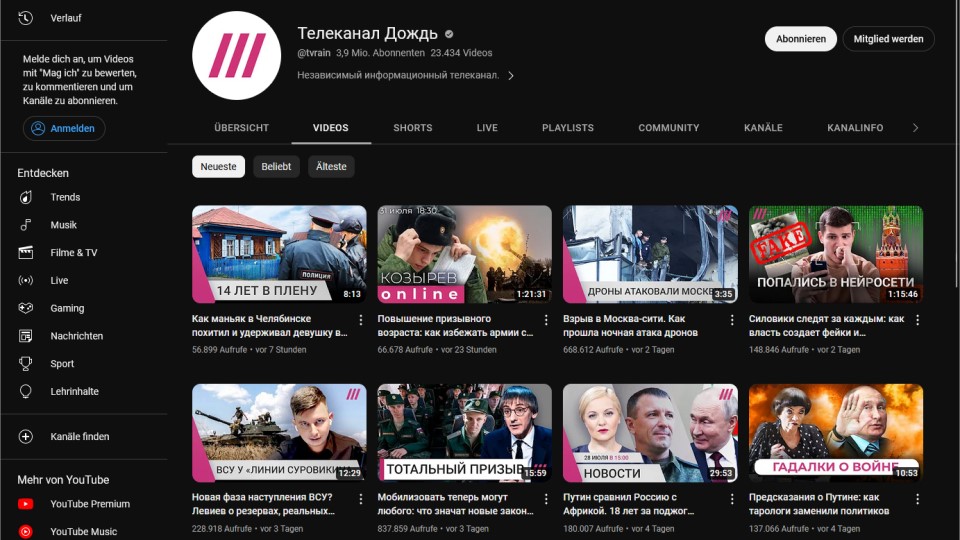Russia declares broadcaster critical of the Kremlin as an undesirable organisation

Russia has put the independent online broadcaster, “TV Rain” (alias “Doschd” or “Dozhd”), on the list of so-called undesirable organisations. Russian citizens that continue to cooperate with the media outlet or wire funds are threatened with a prison sentence of up to six years. Human Rights Watch reported of this, among other things, on Friday. In order to not endanger supporters and viewers from Russia, TV Rain announced to no longer accept donations from Russia and cancelled subscriptions from Russians. It is now punishable to link content from the broadcaster on other Russian platforms or websites.
In their decision, Russia’s prosecutor general accused the broadcaster this past week of “discrediting” Russian authorities, spreading “false information” about the war, supporting “foreign agents” and quoting other “undesirable” media.
Dozhd editor-in-chief, Tikhon Dzyadko, explained to the Russian-speaking news website, Meduza, that one could have anticipated the decision. “The sole purpose of this decision is to deprive the channel of donations, restrict our access to speakers and to intimidate our viewers”, Dzyadko said.
TV Rain explained: “How can you call an organization ‘undesirable’ when 13 million people from Russia alone watched its YouTube broadcasts in the past month?” According to the news agency, Reuters, people in Russia can watch TV Rain via YouTube – even the new categorisation has not affected this. To date, the Google platform is still accessible in the country and an important source of independent information in Russia.
Against undesirable reporting
There are already many other independent, government-critical media outlets like Meduza, IStories and Novaya Gazeta Europe that are on the list of undesirable organisations. Most of them have moved their editorial offices abroad from Russia because otherwise their employees would be threatened with prison sentences.
Among other things, content from these media outlets can not be shared or published in Russia. According to Human Rights Watch, at least five people were convicted of publishing “undesirable” media content between 2022 and 2023 – two other trials are pending.
“The classification of Doschd as ‘undesirable’ means a complete ban of the broadcaster in Russia”, explained Christian Mihr, Executive Director of Reporters Without Borders (RSF), to Posteo. This step shows that the Kremlin also continues to use all their means to fight against independent information. The organisation demanded for the classification to be reversed on Wednesday. “Doschd is in no way undesirable as millions of daily viewers have shown”, according to RSF.
Russian authorities had already previously declared the founder of TV Rain, Natascha Sindeewa (German article), as a “foreign agent”.
Employees at risk
Since its founding in 2010, Doschd (“Rain” in English), has stood apart from Russian state-run television as an independent voice. In 2014, TV Rain was removed from Russian cable broadcast networks and since then has generally only been available in the country via the internet. In the wake of the Russian invasion of Ukraine, Russian communication supervisory authority, Roskomnadzor, announced then in March 2022 that TV Rain’s website would be blocked. They accused the media outlet of intentionally spreading false information about the actions of Russian military personnel.
Editor-in-chief, Dzyadko, and other leading editorial members left Russia in March 2022 as the state began blocking websites. “After the illegitimate blocking of Doschd’s website, the blocking of Doschd’s account on a number of social networks and threats against some employees, it is apparent that the personal security of some of us is being threatened”, Dzyadko explained then.
According to RSF, several journalists had been previously detained in connection with their coverage of the war. On 3 March 2022, the media outlet broadcasted for the last time from Moscow.
Legal means ineffective
Ever since then, the Russian journalists have worked abroad from places such as Amsterdam, Paris and Tiflis.
According to editor-in-chief, Dzyadko, it has not yet been decided whether or not TV Rain will contest the Russian authorities’ decision. Many of those affected have already attempted to contest similar orders from the state. However, they only received the same vague wording that had previously been made by the justice department regarding the cases. In the current case, the broadcaster itself also only received the same abstract statements that could be read in the press statement made by prosecutor’s office. (hcz)